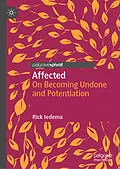This book explores the implications and relevancies of personal affect and organisational complexity for navigating organisational processes, relationships, changes and aspirations. In today's climate, worker roles, relations and responsibilities are becoming increasingly complex and variable. Using personal experiences of organisational conflict as a point of departure, this book reflects on organisational change, complexity and research.
It moves from experiential towards theoretical and methodological issues, exploring the question of how to confront and intervene in organisational complexity. Among others, the main theories brought to bear on this question include complexity theory, affect theory and sphere theory (or 'spherology'). The research approaches and methodologies discussed include anthropology/ethnography, discourse studies, visual research and (the turn to) participatory enquiry.
The book's main message is to advocate for a collaborative, affective, visualised and future-oriented research agenda that rejects the conventional objectivist break and 'division of learning' characterising researcher-researched relationships. It will appeal to students and academics working in the fields of alternative research methods, the social sciences, organisational studies and management theory.
Rick Iedema is Professor and Director of the Centre for Team-based Practice and Learning in Health Care at King's College London, UK. His main research interests include interprofessional collaboration and communication and service users' involvement in practice development. He has pioneered innovative organisational and healthcare communication research methodologies, including video-reflexive ethnography.
"In this book, Rick Iedema shows with profound analytical precision the existential strength of 'being moved' and being affected. Departing from a life being shattered, the books exposes with the help of Spinoza, Sloterdijk, and others, the many dimensions of 'becoming'. Written during the COVID-19 crisis and extreme bushfires a short distance away, the book is a plea for new 'structures of feeling' and for a new way of doing social science research. The book's argument is that today's complexity and pace of change are too intense to be adequately represented purely by distanced and objectifying analysis. His discussion at the end of the book about potentiation and anthropotechnics shows us the way towards personal and intellectual courage: one that allows uncertainty and nurtures emergent kinds of sense, knowledge and intelligence."
- Jessica Mesman, Maastricht University, Maastricht, The Netherlands
This book's main message is to advocate for a collaborative, affective, visualised and future-oriented research agenda. The book finds its inspiration in "the chasm [that separates] philosophising about being shattered and thinking that is shattered" (Heidegger 1946, Letter on Humanism). To explore this chasm, the book journeys through a range of psychological and posthuman perspectives on affect and becoming. The aim of this journey is to reconcile shattered thinking-feeling with Spinoza's ethics according to which 'our capacity to be affected determines our capacity to act'. The book elaborates this capacity to become in terms of our uniquely human propensity to experiment with counter-intuitive inversions: in this case, to call to account that which is affected, rather than that which affects. The book will appeal to students and academics working in the fields of alternative research methods, the social sciences, and organisation studies.
Rick Iedema is Professor and Director of the Centre for Team-based Practice and Learning in Health Care at King's College London, UK. His main research interests include interprofessional collaboration and communication and service users' involvement in practice development. He has pioneered innovative organisational and healthcare communication research methodologies, including video-reflexive ethnography.
Autorentext
Rick Iedema is Professor and Director of the Centre for Team-based Practice and Learning in Health Care at King's College London, UK. His main research interests include interprofessional collaboration and communication and service users' involvement in practice development. He has pioneered innovative organisational and healthcare communication research methodologies, including video-reflexive ethnography.
Zusammenfassung
This book's main message is to advocate for a collaborative, affective, visualised and future-oriented research agenda. The book finds its inspiration in the chasm [that separates] philosophising about being shattered and thinking that is shattered (Heidegger 1946, Letter on Humanism). To explore this chasm, the book journeys through a range of psychological and posthuman perspectives on affect and becoming. The aim of this journey is to reconcile shattered thinking-feeling with Spinoza's ethics according to which 'our capacity to be affected determines our capacity to act'. The book elaborates this capacity to become in terms of our uniquely human propensity to experiment with counter-intuitive inversions: in this case, to call to account that which is affected, rather than that which affects. The book will appeal to students and academics working in the fields of alternative research methods, the social sciences, and organisation studies.
Inhalt
